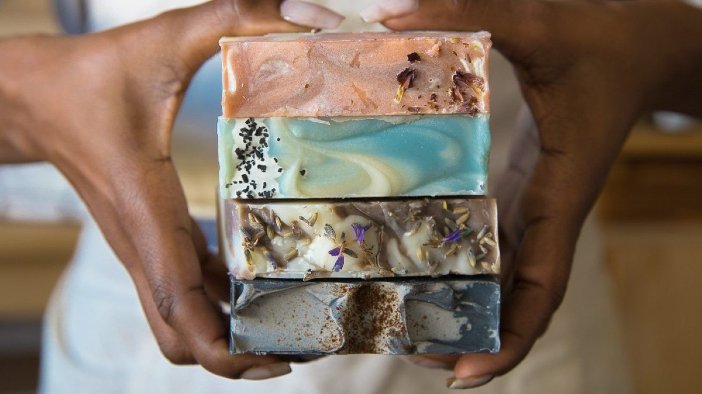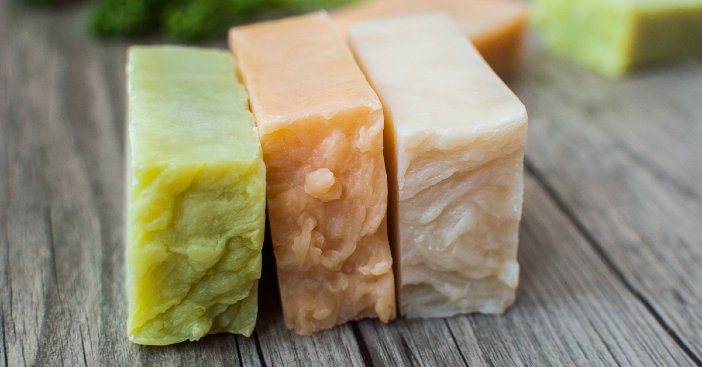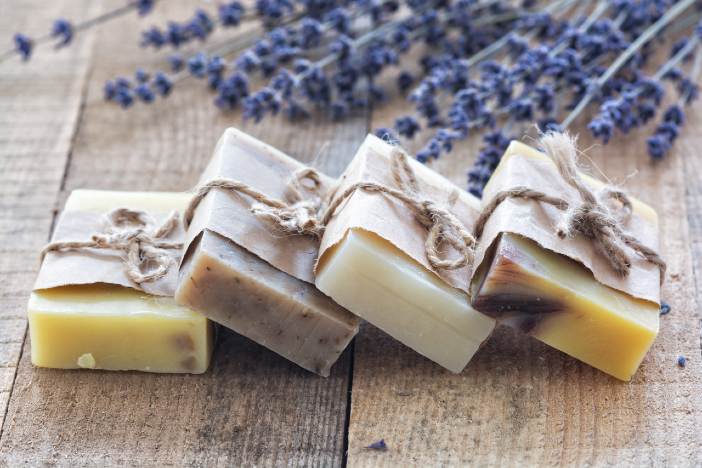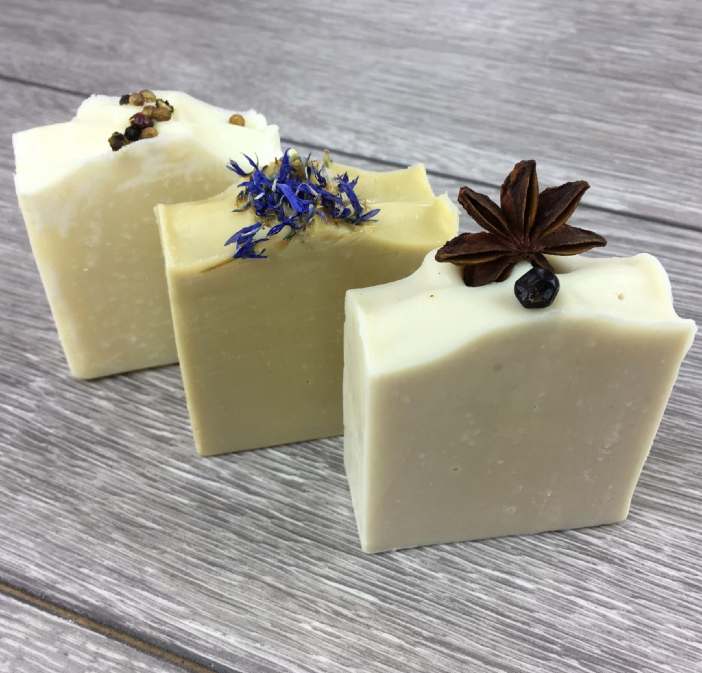Soap is a part of our everyday hygiene. It has been an art that has been practiced for thousands of years. Handmade soap production dates back to Babylon around 2800 A.C. Handmade soap has been a part of various early civilizations with various techniques of making them. And to date, soap making is still a relevant and useful practice in the world.
Some techniques of handmade soap making are still an old tradition passed down from generation to generation. The little list of ingredients makes it easy to know what you are using on your body and also your face. Handmade soaps are also mostly natural and don’t have any chemicals mixed in them, so you are sure that your body is safe from chemical reactions.
If you are looking to buy handmade soap and don’t know where to start, you can start here. This article will dive into what handmade soaps are, why you need them, and how to go about buying them.
Shopping Guide

Handmade soaps come in different types in the U.S. market, and they are great for your daily life. You might not know it but they have natural ingredients that are good for the body. This section will delve into what handmade soap is.
What are handmade soaps?
Handmade soaps are products that are made through the use of simple tools and not in factory-like commercial soaps. They are made with essential ingredients and less mechanized processes like commercial soaps.
Handmade soap has been used for thousands of years before the industrial revolution swept soap making to the factories. The crafting of soap also varies, depending on how you want it to be presented.
When making soap, there is a process that combines a fat and alkaline (mostly sodium/potassium hydroxide) material to create a substance. The chemical reaction is called saponification. You can make this reaction through the hot process or cold process. The process you wish to use depends on the outcome to want, a liquid or a bar soap.
You would enjoy handmade soap because first, it is made naturally. And two it is more superior to store-bought soap. This makes it an excellent product to add to your daily skincare routine because of its skin-loving ingredients.
Why should I use a handmade soap?
Users of handmade soap enjoy many benefits not only to their skin but also in their general lifestyle. For instance, handmade soaps are made of natural ingredients like natural fats or oil bases. These oils can be a vegetable oil, animal oil, or a mix of the two. The fragrances and other ingredients are also naturally derived. These ingredients are also mild on the skin and provide nourishment.
Furthermore, handmade soaps are made of ingredients that moisturize, like glycerin, which is a byproduct of the natural soap-making process. Glycerin is an emollient that attracts moisture from the air, making it the perfect skin moisturizer.
Most handmade soaps are made to last longer than the typical soap and also leave the skin feeling soft. And they are very unique to the artisan making it. Handmade soaps offer unique effects and benefits created by the artisan. You cannot find two handmade soaps the same. It can even be customized to suit your skin’s needs. This makes the soap especially perfect for sensitive skins that react to chemicals easily.
Try the best natural deodorant.
Pros
- It is a homemade process.
- It contains natural ingredients and no additives or preservatives.
- Handmade soaps have hydrating and moisturizing ingredients.
- You can support your local artisan.
- It is environmentally-friendly.
- Handmade soap is a great solution for sensitive skin.
Cons
- Because it is not bulk manufactured, the prices are higher than the commercial soaps.
- Handmade soaps do not perform multiple functions like commercial soaps.
How are handmade soaps made?

Handmade soaps don’t require a complicated process to make. The ingredients list contains three main ingredients; fat from vegetable or animal fat, alkali (sodium hydroxide or potassium hydroxide), and water. Any ingredient that is added is secondary.
With the main ingredients combined together, a chemical reaction called saponification takes place. Triglycerides that make the fat or oil are divided into two properties, glycerin, and fatty acids.
When the sodium or potassium hydroxide comes into contact with water, it heats up naturally. And when the mixture cools and stabilizes, it is added to the oil or fat. The process of it being hot or cold is dependent on how hot the mixture becomes.
After the process is finished, all we have left is glycerin, fatty acids, fat or oil, and water. Then the secondary ingredients like fragrances or natural coloring are added. The good thing about handmade bar soaps is that they don’t require preservatives, but the handmade liquid soap might require it because of its large amount of water.
There are two processes of making handmade soaps; hot process and cold process. These processes determine the outcome of the soap, whether liquid or bar soap.
The hot process is characterized by the use of heat to speed up saponification. It takes less time for the soap to be ready (as little as a week). Other ingredients are also added during the heating to speed up the process.
The cold process on the other hand is characterized by the natural heating of sodium hydroxide due and water by saponification. The waiting period takes about 4 to 6 weeks before the saponification process is usually complete. Secondary ingredients will b added after saponification.
Skincare tips for teenagers to help get clear skin
What types of fat or oils are used to make handmade soaps?
Handmade soaps are usually made with natural ingredients of vegetable oils or animal fat base. The vegetable oil includes different types of carrier oils like olive oil, coconut oil, palm oil, cocoa butter, shea butter, and many more. Many soap artisans create bars of soaps with two or more of these oils to create a variant.
Animal fat on the other hand is commonly extracted from cow or pig fat. But if you are a vegan or vegetarian, there are alternatives to handmade soaps which do not contain any animal products.
What are the benefits of handmade soap to the skin?
One of the most important ingredients in soap is glycerin. Unlike handmade soaps that keep the glycerin intact, industrial soaps are stripped off of glycerin during their own saponification.
Soaps without glycerin do not benefit the skin because glycerin helps to hydrate and moisturize the skin. Also, glycerin is non-comedogenic, which will help prevent acne breakouts on the body.
Glycerin is an important ingredient in homemade soaps because it helps the skin to absorb moisture faster and it has little reaction to the skin. This makes it excellent for people with sensitive and dry skin.
How do I incorporate handmade soap to my beauty routine?

Because of their making process, handmade soaps are not meant to be left for too long in the sink. They also do not contain artificial ingredients or chemicals, which means you don’t have to worry about your hands drying out. They can be used on the body with long-lasting fragrances that are made from natural extracts.
The ingredients will take care of your skin and keep you hydrated. You can also have a clean and clear face with homemade bars. But always look at the list of ingredients before you use the soap on your face. Some skin types still dry out with the use of homemade soaps.
What effects do handmade soaps have on the environment?
Soap artisans use natural products to make handmade soaps. There are little to no preservatives in the soap, neither are there chemical additives, which make handmade soap perfect in lessening the damages to the environment. The ingredients are acquired naturally and are very environmentally-friendly.
There are also soaps for vegans or vegetarians who want to opt for non-animal products. And the packaging of the soap is usually unique and mostly comes without plastic containers. This will reduce plastic waste with your purchase, and to a large extent, the earth.
Shopping Criteria

Before buying your handmade soap, you have to consider so many factors that will influence your buying decision. This will help in great lengths especially for those who do not know where to start from when it comes to buying handmade soaps. We will be highlighting the criteria you need to use as a yardstick before buying your soap.
Base fats or oils
As we already know, handmade soaps are mostly made of fats base that could be animal fat or vegetable oil. If you are vegan or vegetarian, you should keep this in mind before buying the products you consume.
Handmade soap is mostly made of a fat base that comes from cow or pig fats. These produce softer, creamier, and firmer soaps. Soaps made from animal fats are usually more expensive. And if the animals come from an organic farm, the price will be higher.
Meanwhile, vegetable oils used for handmade soaps include olive oil, coconut oil, palm oil, and the likes. These oils have many benefits to the skin and also contain antioxidants that help the skin stay fresh and smooth. And a final option could be a combination of the two, which is common for most handmade soaps.
Process
Handmade soaps are produced through the hot process or cold process. These methods have different end results. The texture you and what ingredients can be added also vary by the process used in making the soap. For instance, a flower petal cannot be added to a cold process because it would lose its color during saponification.
You should also be sure you are getting the real deal. Some cosmetics companies might misuse the title of their soap just to get people to buy. Make sure the soap is really homemade and organic before you buy it.
Fragrance
This is an important factor to consider when buying a handmade soap. The smell is what will attract you. Some artisans only make use of the natural smells from vegetable oils or fats to create a natural essence for the soap. Others add essential oils like lavender, rosemary, rose, and others to give the soap a better scent.
Before buying, know what type of fragrance comes with the soap. If you have reactions to some of these ingredients, it is best you stay away from them. Also, your option should be 100% organic. The soap must not contain chemical fragrances that are not good for the body.
Added ingredients
Certain artisans add special ingredients that would change the look and purpose of their soaps. For instance, some add goat milk to serve as a creamy feel. Other types of common additional ingredients include flower petals, sugar, or papaya. If you have sensitive skin, be careful to not buy soaps that have ingredients you easily react to.
Recommended Handmade Soaps
Knowing everything you should know and what to look out for in handmade soap, you can now buy the best one. If you still do not know what to buy, we have compiled a list of the best handmade soaps. The list is based on customer reviews and responses.
Best Vegan
Aegean 100% Natural Bar Soap is made from vegan and moisturizing materials. Mixed with essential oils, the soap is invigorating and cleansing. Also, it helps to fight bacteria, germs without synthetic chemicals. It is also alcohol and sulfate-free. The soap is ideal for all skin types with it being hypoallergenic. It does not irritate sensitive skins. And both men and women can use the vegan soap.
Best Gift Set
If you want to get a nice gift for a special person, you can try Bali Soap Natural Bar Gift Set. It can be used by both men and women for the face and body. It comes in six different scents of coconut, papaya, vanilla, lemongrass, jasmine, and ylang-ylang. Besides the scents, it does not leave any residue behind after use.
The soap also has natural glycerin to moisturize the skin and keep it supple. Dry skins can use the exotic blends to exfoliate and keep their skin looking fresh. Plus, it comes in a cute gift wrap pack suitable for any occasion.
Best Made in U.S.A
As one of the best choices for handmade soaps, Amish Farm’s Handmade Bar Soap is simple but effective. It won the award for Made in America Best Product Award at Smoky Mountain Gift Show. It has a calm blend that is gentle for all skin types, including sensitive skins.
The soap is made through a cold press, which means no added chemicals, but just natural ingredients that enrich the silky soap. It is creamy enough to double as a shampoo and even good enough for pets. It is truly the household product.
Best Charcoal Soap
Charcoal soaps are gaining lots of attention for their exfoliating and deep cleansing properties. Aogari’s Bamboo Charcoal Plant Oil Handmade Soap helps to treat acne, exfoliate, and improve skin immunity. It can be used by both men and women.
Also, the soap helps to maintain the skin and balance grease and natural oil. You won’t experience tightness and dryness after using the soap, and your skin will become clear with long-term use.
Summary
Homemade soaps are excellent if you want to switch to environmentally-friendly products. Not only do they improve your skincare routine, but they also improve the environment. They are made with three main ingredients, water, vegetable or fats, and sodium/potassium hydroxide. The ingredients have a chemical reaction that is called saponification can be processed to make soap through the hot or cold process.
When going for homemade soaps, remember to check if they are 100% natural, which means they are made from natural ingredients and without preservatives and chemical additives. The unique thing about handmade soaps is that they can be made based on the artisan’s choice of ingredients and purpose, which makes them different from the generic industrial soap.
Now that you have all the information you need, you can go ahead to buy yourself a good handmade soap.
Loved this article? You can get more like this by following this link.




